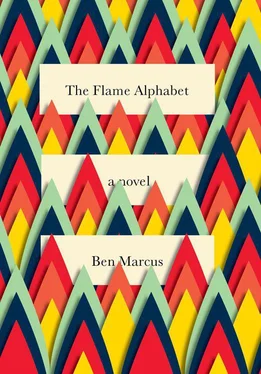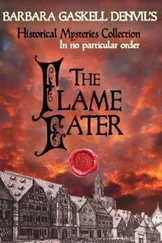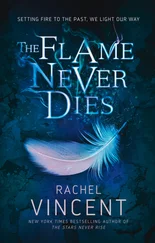On such nights I was critically chilled and scraped absolutely raw from such contorted sleep, but I walked home under streetlights and felt so lucid, so glaringly vital, that it scared me to open the door to my house again and fight back through the awful air to my room, where I would fail to sleep in noxious proximity to something my body could no longer endure.
On days of minimal exposure to Esther, I conducted perimeter and fence line ambient air quality tests and sent in the results for analysis. Sediments of speech, airborne now, might indicate different toxicity thresholds throughout the area.
The numbers that returned offered no insight I could use.
I utilized a real-time aerosol monitor with data logging, purchased secondhand from Science Exchange. Collecting air samples was straightforward, and I looked like any citizen out for a night of hobby work, gathering bugs in a jar, not that anyone ever stopped to question me.
This after administering a full broad-spectrum heavy-metals panel, inconclusive on us both.
This after following the standard collection protocol for poisoning, testing our blood, hair, saliva, and nails.
Such samples I scraped from Claire when she slept. Humors for a futile investigation.
You’ll gain no satisfaction through tests of the air or water, was a sentence making the rounds.
Point the testing wand into the child’s mouth, was another favorite.
Or, fill the child’s mouth with sand.
The walks each evening were my prescribed escapes from the home, and they became a necessary after-dinner regimen. I performed smallwork with salts, knowing little of how to modify my tonic, knowing nothing of a delivery system through poultice applications on the sweeter nerves inside of my arms, the so-called Worthen site, proceeding only with some unmodified antiseizure agents as a foundational syrup.
Laughably amateur modifications, yet ones I hardly understood. I needed to believe Thompson that my own understanding played no role. I could execute a procedure without knowing why. I had to believe, per Burke, that my own insights, if I even had them, were an impediment to survival.
At our home, since Esther’s return from camp, little household habits emerged that soon were absorbed into our schedule. A scattering after dinner, improvised medicine injected into the fatty softness of the leg from a Windsor needle, then flight outdoors. We practiced, with full complicity, an avoidance altogether of family time.
For once, Esther’s disgust for us was mutually convenient. An altogether necessary disgust. We exploited it, allowed her to think we were keeping our distance at her request. But we saw her sometimes looking in at us from doorways, without her scowl, her body free of its habitual disdain. She stood in her pajamas and watched us, radiating something very close to concern.
Most nights Claire disappeared into the crafts room, or had never come out of it in the morning. Technically no crafts emerged from this part of the house. We named it once with the hope that someone, sometime—a future child of ours, perhaps—would go in there and be productive, make something pretty or useful or interesting. Such were our speculations for the children we might have. They would fashion objects that glowed or spoke, and we would sit in wonder as we held their tremendous work in our hands. This was, apparently, one reason to bear children. It would guarantee some future astonishment, restore to us our sense of surprise. Our children would solve some fundamental boredom we could not escape, and it would happen here. We could not wait to feel proud of something like that.
Now the room contained a guest cot and an unplumbed sink, with one window painted shut. Some tub buckets and a little footlocker and a fridge lined the floor. The linoleum was buckled in the corner, beneath a baseboard that had grown so sodden and soft that I finally pushed a night table against it to block it from my sight.
The occasional brownish rag came out of Claire’s room and a stack of clean rags went in.
On the night I met Murphy, dinner was abandoned. Perhaps it had never been attempted. Esther slipped into her room, where gelatinous bird sounds flowed out, half-words and astringent syllables that produced a low-grade menace.
I’d braved a conversation with her, counting on her angry silence, which she delivered with force. I asked her, nervously, to limit her speech, with every expectation of getting shouted down, of getting mocked by our skilled and vicious little mistress. She smirked off, sparing me any response, and in the following days she launched a campaign of sonorous gibberish whenever she thought we were in earshot, and that earshot was something harder and harder to escape.
Earshot . Such a very true word.
My plan was to track my symptoms without appearing too conspicuous. Beneath my coat I buckled my DRE Axis 4 portable vital signs monitor. The tubing had gone yellow, and cabling was exposed through the insulation, but the device held a steady charge for my outings and collected reliable data.
At the corner of Hospring and Woods, where the evergreens hung skeletal and brown, with sick branches that looked burnt by wind, I stopped for a one-mile readout.
A row of privets concealed the single-level houses that ran south along Hospring, and there in the unweeded mulch bed at the roots I saw, for the second time, the strange man from the picnic trail, the redhead who’d threatened the Jews. He was retching into the weeds, giving it his all.
He had seemed daunting when I first saw him off the trail, hulking over the Jewish couple as if he might carve into their backs and eat them. Now he was ill, on his knees.
I recalled a sermon Burke had delivered months ago, when everything from the Jew hole was still safely abstract, wisdom I could enjoy in the unactionable pit of my mind. They will sniff at your legs, went Burke’s sermon. They will wish they were you. Beware the man on his knees, the display of weakness. But the sermon had not passed through the radio coherently that day; static cloaked the transmission. Every other word was weakness , as if the broadcast were looping by mistake. We were to fear weakness not in oneself, where it should be cherished, but in others. Or not fear it, but mistrust it. We too easily believe in the trouble of others, erect a machinery of caring. Look through the story at the teller’s need, was the caution. Share not your full story, went the warning.
I stood closer to the hedge, tried to see the redhead’s face, thinking that at least he’d hear scuffling and turn to acknowledge me.
When I approached him, a pale cylinder of liquid birthed from his mouth, his lips stretched to allow its passage. A faint hiss followed, almost pretty, like crickets in the trees at night, but then a sour smell filled the air.
He was decorous in his expulsion and it appeared to come at no visible cost to his body. I reasoned that he must vomit with some regularity. He made it look natural, as if his face occasionally needed to void itself.
I turned away as he finished and asked if he needed any help.
The retching stopped.
“Oh, goodness,” he said. “I didn’t see you there.” He coughed, swallowed, arranged his appearance.
This was Murphy’s first lie.
I frisked myself for a tissue I didn’t have.
He brought out a handkerchief, touched it to his mouth, as if he were dabbing a drop of soup from his lips.
“Sorry about that. I thought I was alone. Give me a second.”
He opened a tiny bottle, swished a mouthful, then spit a black mess into the bushes. From a small tin he scooped a grease with his finger, then smeared it inside his mouth, running it around with his tongue. Some flavoring to mask the bile, maybe. I wasn’t sure.
Читать дальше











